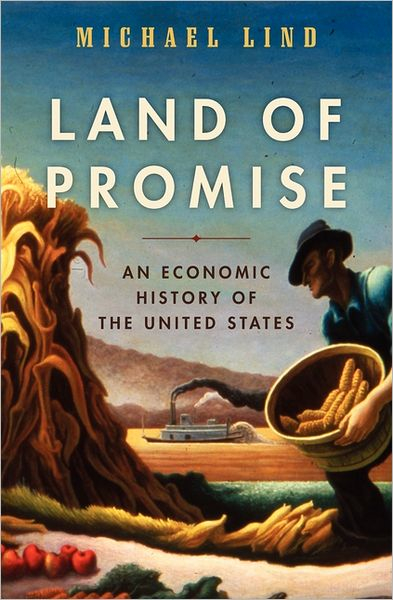 Reviewed: Land of Promise: An Economic History of The United States, by Michael Lind (Harper, 592 pp., $29.99). America is fickle. Or at least our economic history is. According to Michael Lind, author of Land of Promise, we can’t make up our minds about the role of the federal government in the economy, and the result is neck-snapping oscillations between feuding schools of thought.
Reviewed: Land of Promise: An Economic History of The United States, by Michael Lind (Harper, 592 pp., $29.99). America is fickle. Or at least our economic history is. According to Michael Lind, author of Land of Promise, we can’t make up our minds about the role of the federal government in the economy, and the result is neck-snapping oscillations between feuding schools of thought.
On one hand is the school of Alexander Hamilton, who believed a strong centralized government should shepherd private enterprise toward goals in the national interest. On the other is the school of Thomas Jefferson, who preferred a nation of small farmers, small business owners, and a limited government to serve them.
From Hamilton comes the theory of developmentalism, whose initial proponent, economist Henry Carey, was praised by none other than Karl Marx. Developmentalism, Lind explains, held that “the private and public sectors [are] collaborators in a single national project in maximizing the military security and well-being of the by means of technological modernization.” Carey believed in tariff protection of infant industries and government support for production. The basic idea is that a country isn’t free until it fends for itself.
From Jefferson comes producerism, which views the relationship between government and enterprise as fundamentally adversarial. This is the progenitor of neoliberalism, whose foremost advocates have been Andrew Jackson and Ronald Reagan. “The purpose of the state,” Lind writes, “is to remove barriers to free exchange among individuals and firms, and then, once those barriers are removed, to limit its activities to enforcing the rules of competition.” Other than law enforcement, there is no legitimate role for the federal government. Activity beyond these is tantamount to tyranny.
In terms of markets serving people, not other markets, one of these schools is better than the other. To developmentalism, we owe the railroads, aviation, and the internet; a military mighty enough to defeat the Nazis; and the Civil Rights Act. To producerism, Lind writes, we owe “the balkanization of the economy by states’ rights…underinvestment in infrastructure, [and] irrational anti-trust laws.”
The force behind this ideological churn is technology. Inventions like the steam engine, electric motor, and microprocessor “destabilized existing economic, social and political arrangements, forcing Americans to adapt by creating, in effect, a series of new republics while keeping…the old name of the United States of America.”
It’s a recurring pattern. Every 30 to 40 years, Lind posits, one republic rises from the ashes of another when the economy and the sociopolitical order drift apart. During these periods, figures like Jackson, William Jennings Bryan, and Reagan call for regressive policies, leading to national crises like the Civil War, the Great Depression, and the Great Recession. Reformers like Henry Clay, Abraham Lincoln, and the two Roosevelts then emerge with a renewed Hamiltonian vision, and the public and private sectors cease competing in order to modernize legal, social, and political institutions and enable nation-building.
To say that today’s Democrats are the Hamiltonians and Republicans are the Jeffersonians is to ignore the political center’s rightward drift since the 1970s. Even the Great Recession can’t banish Jefferson’s ghost. Instead of building industrial policy, infrastructure, and renewable energies, we argue deficits and spending. It’s enough to drive one into the arms of socialism.
Indeed, to many of a certain age, socialism is the only alternative to Jeffersonianism. It doesn’t help that charges of socialism are usually leveled at any proposal, however modest, that government should regulate more.
But this is part of the point of Land of Promise. Alternatives are abundant in our own history. In fact, American-style developmentalism influenced a contemporary of Marx, economist Friedrich List. List’s German historical school saw economics as politics and policy, not science. That kind of thinking was re-imported by American progressives eager to reform the unfettered capitalism of the early 20th century.
So the next time you’re called a socialist, remember: That’s just a reminder that you are an American.
John Stoehr is a lecturer in political science at Yale University. His writing about politics, religion and culture has appeared in American Prospect, The New Statesman, Reuters, The Guardian, Dissent, Religion Dispatches and The New York Daily News.


0 Comments